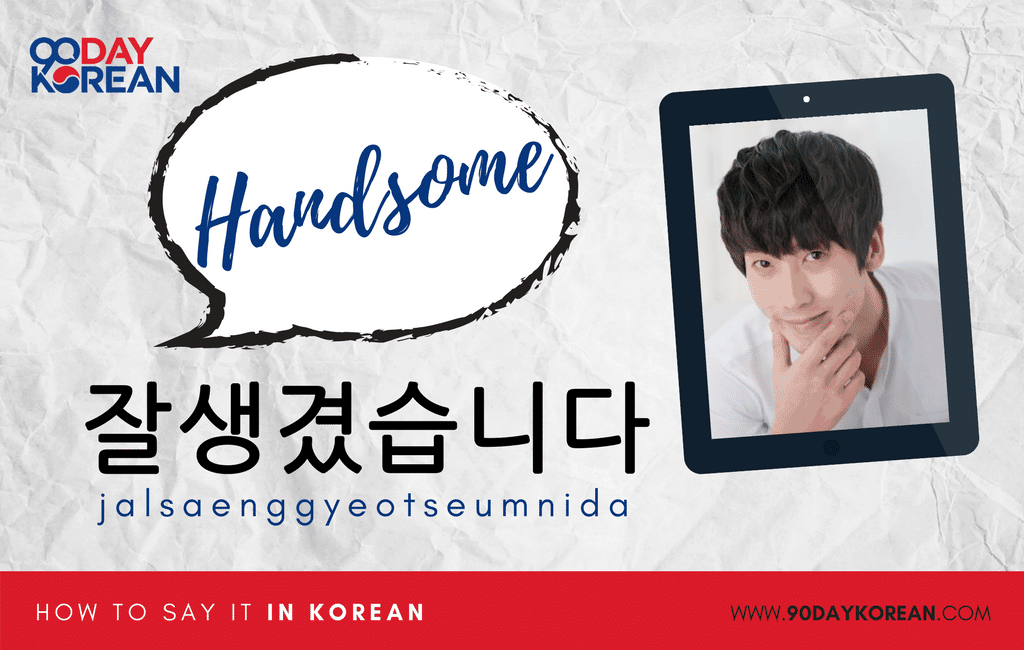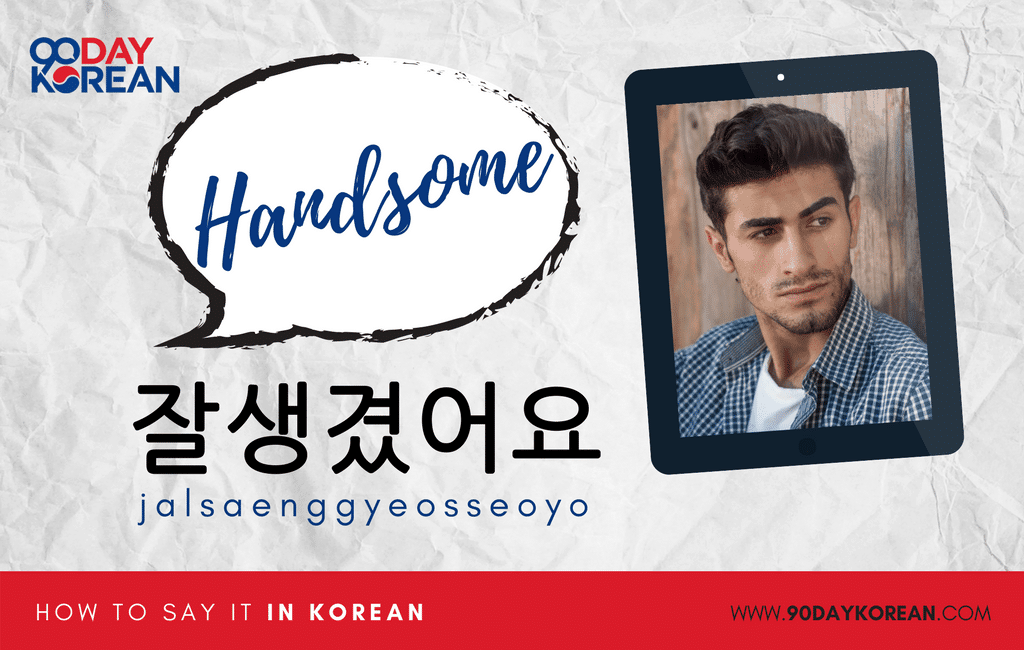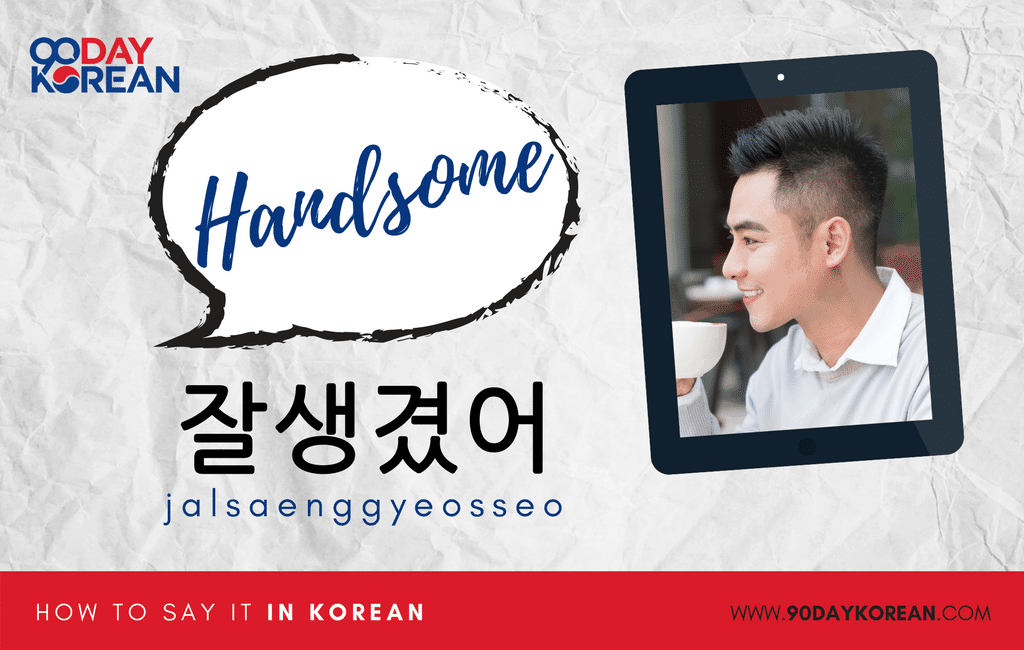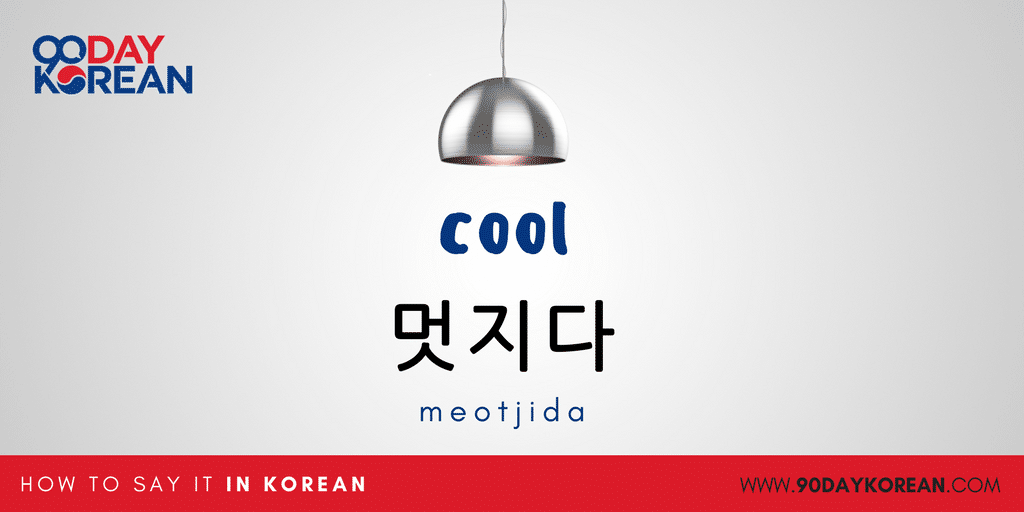Ever wondered how to say “handsome” in Korean? Like in English, Korean uses a different word when calling men handsome than when calling women pretty.
In this lesson, we will teach you how to say “handsome” or “good-looking” in Korean!
After learning this word, feel free to practice it on any good-looking guys that you see. They’ll enjoy the compliment! We also included a FREE PDF guide of this lesson that you can take with you on the go. Check it out below:
Let’s get to it!
Contents
Different ways to say “handsome” in Korean
There are several ways to say “handsome” in Korean, depending on who you are talking to. We’ve categorized them into their formal, standard, and informal versions.
How to say “handsome” in Korean
Before we head on to the explanations and sentence examples, here’s a video on how to say “handsome” in Korean. Make sure to listen carefully to learn the right pronunciation of this word!
Formal “Handsome” in Korean
The word for “handsome” in Korean in its formal version is .
You might hear this word in presentations, interviews, or other formal situations.
Example:
그 배우가 잘생겼습니다. (geu baeuga jalsaenggyeotseumnida)
That actor is handsome.
Standard “Handsome” in Korean
The standard way to say “handsome” in Korean is .
You can use this expression when talking to people who are older or not particularly close to you.
Example:
당신은 아주 잘생겼어요. (dangsineun aju jalsaenggyeosseoyo)
You are very handsome.
Note: You should replace the word 당신 (dangsin) with the person’s name/relation to you (e.g. 아저씨 (ajeossi) / 오빠 (oppa))
Informal “Handsome” in Korean
To informally say “handsome” in Korean, you can use the word . You can use this expression with people who are very close to you, such as with your boyfriend or date. Say it to your significant other along with these Korean terms of endearment.
Example:
너는 아주 잘생겼어. (neoneun aju jalsaenggyeosseo)
You are a very handsome man.
Apart from the words you’ve learned above, there are other ways to express a similar description or compliment. Here are some of them.
“Cool” in Korean
The word 멋지다 (meotjida) is generally used to express “cool” or “stylish.” However, when you’re using it on a man’s face, it means “handsome.”
There are several other words that you can use to pay compliments, such as 매력적이다 (maeryeokjeogida). This word means “appealing.” The word 매력 (maeryeok) means “appeal.”
Example:
그는 제가 만나 본 가장 멋진 남자예요. (geuneun jega manna bon gajang meotjin namjayeyo)
He is the coolest man I’ve ever met.
그는 내가 만나 본 가장 멋진 남자야. (geuneun naega manna bon gajang meotjin namjaya)
He is the coolest man I’ve ever met.
“He is handsome” in Korean
If you want to say, “He is handsome,” then you should use the word 잘생겼다 (jalsaenggyeotda).
If you are saying the word to yourself (Koreans often talk aloud to themselves), then you can use this form. However, if you are saying it to somebody else, then the word needs to be changed based on who you are saying it to.
“You’re handsome” in Korean
Another way of using 잘생겼다 (jalsaenggyeotda) is to say, “You’re handsome.”
For example:
오빠, 잘생겼어요 (oppa, jalsaenggyeosseoyo)
Oppa, you’re handsome.
“The Handsome Man” in Korean
If you want to say “handsome,” as in “the handsome man,” then you should use the word 잘생긴 (jalsaenggin).
Example:
잘생긴 남자 (jalsaenggin namja)
handsome man
잘생긴 배우 (jalsaenggin baeu)
handsome actor
잘생긴 가수 (jalsaenggin gasu)
handsome singer
그녀는 아주 잘생긴 남자와 함께 왔어요. (geunyeoneun aju jalsaenggin namjawa hamkke wasseoyo)
She arrived with a very good-looking man.
A Word of Caution About Romanization
We’ve added in the Romanization for all of these words to help with pronunciation. However, we recommend that you try to move on to reading comfortably in Hangeul (the Korean alphabet), as this will improve your pronunciation and your reading skills.
It will also help you notice patterns in words, which will lead you to improve the rate at which you learn new Korean words and grammar points.
You can download a free guide to learning the Korean alphabet in about an hour here.
Learning vocabulary words is a great way to help you learn the basics of a language. You can boost that by attempting to have conversations in Korean. Take a look at some of our related resources:
We also have a fully structured online Korean course for all the help you will need when studying Korean.
Wrap Up
Now that you know how to say “handsome” in Korean, get out there, pay compliments, or say hello to the good-looking guys that you run into!
To give the same compliments to the prettiest people you know, learn how to say “beautiful” in Korean here!
If you’d like to know more descriptive words like “handsome” in Korean, you can read our article on Korean adjectives.










Hi. How do you write in Hangul,
“I love you, handsome!”
which you intend to directly say
to someone you’re talking to?
The handsome word there refers to an idol. Please help ????????
“I love you, handsome!” in Korean can be “미남, 사랑해!” ^^
Hi!
How come people say 잘생겼어 instead of 잘생겨 to someone? It’s similar when saying something is delicious. Why is the past tense used instead of present tense? Thank you!
Good question, Alice! 생기다 means ‘to be formed’. So 잘생기다 actually means ‘to be well formed’, that’s why it’s said in the past tense. ^^
No, delicious is not in the present tense
맛있어 (delicious/tasty) is 맛+있어.
맛 is “taste” and 있어 is “there is”. (있어 is the present tense form of the verb 있다 (to exist, to be, to have…)
Taste + there is = there is taste = tasty.
Sorry, I meant to say it’s not in the PAST tense
Good Morning! Thank you so much for really helping me but I wanted to ask why I sometimes hear idles ( specifically SEOKJIN) say something that sounds like jalsongaetta or such when they say handsome.
Hi, Suha! I think it’s ‘잘생겼다’. It means the same as the informal sentence ‘잘생겼어’ in this post. ^^
Thanks soo much for being there to correct me and reach me! I really appreciate it. Stay safe
Awesome! It’s our pleasure. ^^
Jeonun sneha imnida .there are lot’s of love from INDIA.
Thanks for the comment, Sneha! ^^
If I wanted to say “My handsome” as a nickname, would 내잘생겼어 be correct?
Hi, Lisa! It’s better to say “(내) 잘생긴 name” for “my handsome”, for example, “내 잘생긴 마이크”. ^^